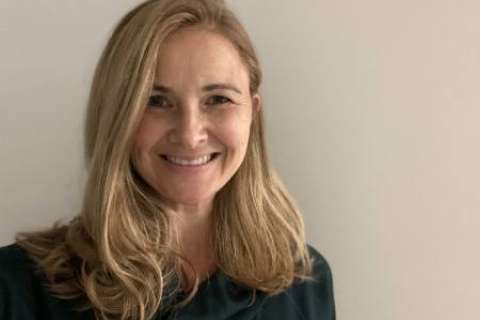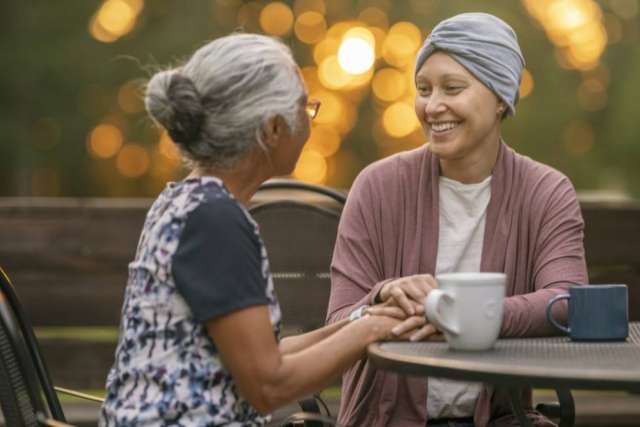You have cancer. These three words from a doctor change a person’s life and mindset immediately and forever.
Fortunately, the medical side of treating most cancers advances every year. At UCLA Health, where much of that medical progress is being made, patients also are benefitting from an extensive effort to not just cure the cancer but treat the whole person, who has to deal with the frightening news and then go through the treatments, all while fielding input and questions from friends and family.
Elizabeth Cleary, PhD, a staff psychologist with the Simms/Mann-UCLA Center for Integrative Oncology, is one of the therapists who provides care. She helps patients identify their feelings while also being confronted by well-intentioned but sometimes unhelpful input from loved ones.
“A cancer diagnosis means different things to different people,” Dr. Cleary said. “It is a different experience for everyone. When we sit down with a patient, we tailor support specifically for them, to address their needs and to help them manage this life-changing experience.”
In their initial meetings, Simms/Mann clinicians will engage in guided conversation about the specifics of the patient’s life and the impact of cancer. They will discuss work and interests, what kind of friends and family are involved, other medical conditions, and whether the patient has children who will be involved.
“Once we understand someone’s unique context and experience, we are able to be nuanced and specific in how best to support them,” Dr. Cleary said. “It’s not ‘one size fits all.’ We tailor the support so that they can most effectively utilize the amazing resources we have here.”
Dr. Cleary said it’s important that patients allow themselves to experience and express a full range of feelings. While it can be helpful to cultivate hopefulness, forcing oneself to “think positively” all the time is unrealistic and often counterproductive.
“Most people who receive a cancer diagnosis will experience fear, anger, worry and grief,” Dr. Cleary said. “It is not effective to try to avoid those feelings. Instead, we name them and validate them. Often when we feel and share more difficult feelings, they will actually dissipate. We have no evidence that feeling those emotions are harmful or dangerous, so we want patients to give themselves permission to experience and express them.
“I want them to give themselves the kindness and compassion they would offer someone else going through this experience,” she said.
The Simms/Mann team offers patients programs at no cost that promote mindfulness and a healthy lifestyle, while specifically targeting cancer-coping skills. Some of the support includes workshops and groups on practicing meditation, Qi Gong, or art therapy, as well as ways to better manage stress, to improve sleep, and to communicate effectively with the medical team and loved ones.
Communicating with loved ones
As much as loved ones provide invaluable support, they can also be frustrating for patients. Well-meaning loved ones often offer advice, mention articles they’ve read, or recall previous experiences with people who have had cancer. Dr. Cleary helps patients set a plan to communicate clearly what they want and need, and sometimes suggests putting that in writing to loved ones.

“It is important to be clear, direct and kind when expressing needs and giving feedback to loved ones,” Dr. Cleary said. “This can be hard to do, so we offer and practice specific language with our patients.”
While this helps the patient avoid getting unwanted advice, sympathy or anecdotes, it also helps the loved ones know what kind of support is most needed, whether it be a ride to treatment, helping out with children, empathetic listening, or another need.
“We validate that the loved ones also are coping with the experience,” Dr. Cleary said. “Loved ones want to help, but they can’t read minds. We want them to know what kind of support is wanted or needed from our patients.”
The Simms/Mann Center offers a range of support and services to patients’ family and friends, including counseling, caregiver support groups, workshops and other no charge services to help them cope with the experience and to better help the patient in a time of need.
Filtering out the Internet
The other influence Dr. Cleary and the staff address is all the noise on the Internet that can be distracting for patients. It is all too easy for a patient to read horror stories that induce anxiety, or hero stories that build undo pressure and expectations.
It's in part for that reason that the Simms/Mann Center is creating a new website with curated, accurate and educational information for patients.
“A patient’s medical team is the best source for accurate and tailored information for their specific case,” Dr. Cleary said. “Information found online tends to be very general, and also emphasizes the extremes, as people share the highs and lows of their experiences.”
Again, Dr. Cleary likes to tailor her guidance to the individual.
“I encourage people to check with themselves about how searching for information on the Internet makes them feel – more reassured, clear and calm, or more overwhelmed and anxious,” she said. This response can help the patient make decisions about whether to be online and what type of online information is helpful for them.
What a patient really needs for clarity and guidance, she said, is information directly from medical professionals treating that individual.
Learn more about psychosocial support available through the Simms/Mann Center.
Tina Daunt is the author of this article.




